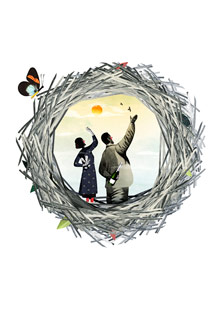The End of Empty Nest Syndrome

Illustration: Brett Ryder
Good news for any mother dreading the empty nest: A little bird told us it's not so bad.
Jane Shure wasn't surprised by her grief—the sense of deep loss, the resonating silence in the house—when her youngest daughter left for college; what shocked her was how quickly it dissipated. "At first simply driving past a soccer game would make me weepy," says the 54-year-old mother of two from Philadelphia, who officially became an empty nester in August 2007. "But by December, I remember thinking, "I've adjusted." Suddenly she and her husband were going on impromptu dates and getting together with friends. And Shure, a family therapist, threw herself into editing a clinical treatment book—something she would never have time for if the girls were still home. "I absolutely miss my kids," she says, "but I'm enjoying a really full life now." Research is confirming what many mothers have been discovering—that "empty nest" syndrome isn't so empty after all. These days, the classic description of lingering depression, apathy, and loss of identity ("Who am I if I'm not taking care of the kids?") is no longer typical. "Our mothers talked mainly about their pride and joy in watching their kids make this transition and the relief they felt in seeing the fruits of their labor realized," says Christine M. Proulx, PhD, a University of Missouri professor whose 2008 study found that mothers took their children's departure no harder than fathers. (According to another 2008 study out of Wheaton College, fathers were actually less emotionally prepared.) One reason for the shift is the growing number of women with fulfilling careers; another is the advance of communication technology like cell phones, PDAs, and computers. "When I went to college, I had to schedule one day a week when I could call home from the dorm phone," Shure says. "Today I chat away on Skype with my oldest in Madrid as if she were sitting next to me."
But the empty nest isn't just survivable—it can even be beneficial. When Sara Gorchoff, PhD, a postdoctoral researcher at UC Berkeley, and colleagues tracked marital changes in 123 women from their 40s to their early 60s, they found that empty nesters reported greater satisfaction with their partners than did mothers with children at home. "It wasn't simply having more time for each other that made the difference," Gorchoff says. "It's what they did with their time that counted." A fall Sunday with the kids can now become a chance to go hiking together; raucous family meals turn into intimate dinners for two. And sex can regain some of the old abandon of the pre-children days.
Of course, the passage to a childless household is not a happy time for everyone: It can be particularly tough on some single mothers who, overnight, find themselves completely alone, and for those in fragile marriages that have been held together mainly by the glue of raising a family. And there are mothers (about 10 percent) for whom empty nest syndrome does become a long-term issue, according to a survey of about 1,000 women by Carin Rubenstein, PhD, author of Beyond the Mommy Years: How to Live Happily Ever After…After the Kids Leave Home. "But these women are likely already prone to depression, and the change tips them over." For most mothers, says Rubenstein, this next stage of life is one to look forward to, especially if you start planning before it arrives. "Join an art class, volunteer in your community, look into continuing-ed classes, renew friendships. Engage in other roles and ways of living, and you'll discover the confidence and rich well-being that can blossom with this freedom."



